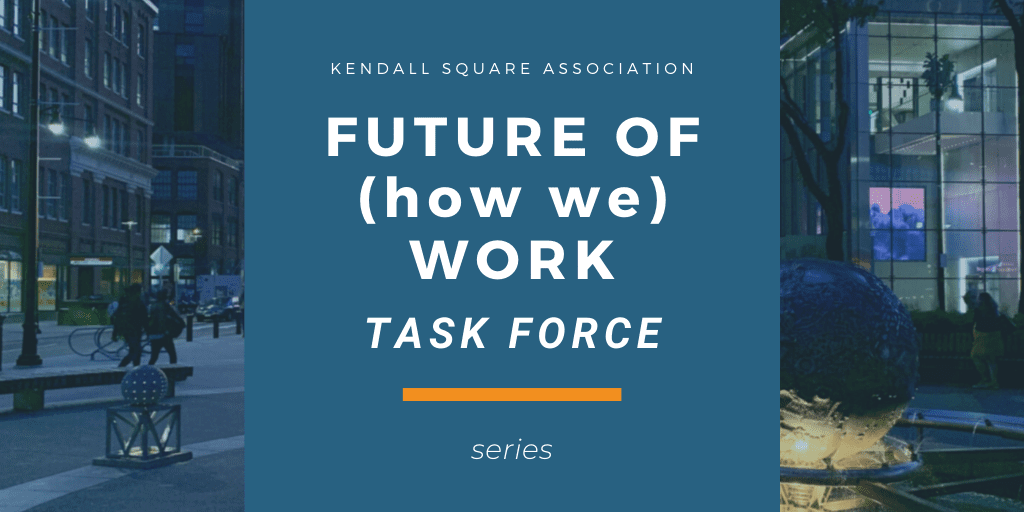Kendall Square Association’s (KSA) Future of (How we) Work Task Force answers critical questions about how our innovation ecosystem will return to work in a post-COVID-19 world.

COVID-19 and the rapid shutdown posed an immediate set of challenges for leaders across the globe. In Kendall, KSA and business leaders rapidly adapted to make sure essential operations were maintained and refocused to meet the challenges of the global pandemic. As the response horizon lengthened, our community began planning for a future of operating amidst COVID-19.
New questions began to emerge about how to operate in our next normal. At the KSA we realized that our community needed to harness the power of our proximity, even though we were apart. We called on Kendall leaders to join the Future of (How We) Work Task Force, a group designed to foster the type of open source idea sharing that makes Kendall a leading innovation community. The Future of (How We) Work Task Force has addressed topics including transportation, workplace safety, open space, and supporting small businesses.
As we all navigate the dynamic circumstances of the COVID-19 pandemic it’s difficult to forecast what our next normal may be, or how long it will be our normal. However, based on the insights and conversations of the Future of (How We) Work Task Force in May, we can begin to paint a picture of the next phase of normal for our innovation community:
- Health and Safety protocols will change how we use the office. Employers have adopted a multi-pronged approach to keep employees safe and healthy during the COVID-19 pandemic. While many of these practices like physical distancing and wearing a mask are part of our total existence, employers have a unique role in providing testing and tools for self screening.
- 9 to 5 is a thing of the past. While physical distancing and the concept of essential workers have led to widespread adoption of new “work from home policies,” another important trend is the emergence of absolute flexibility in work schedules. Employees who do need to be in the office or lab can arrive and leave based on what makes the most sense for them and the task they need to perform. These policies also have the added benefit of allowing employees to commute “off peak,” avoiding traffic congestion and overcrowded transit.
- How we get to work won’t look the same for a long time (if ever). From rolling out policies that encourage flexible start and end times for workdays so that employees can avoid off-peak commutes to promoting biking and flexible parking options, employers are thinking about how to safely get folks to and from work. The MBTA is expanding on the work they’ve done with MIT and has partnered with KSA for a new pay-per-use pass as a part of our Transportation ADVANCE initiative.
- The future of small business depends on community support. The City of Cambridge campaign, “Pick it up, Cambridge”, has helped locals source food directly from restaurants. With the support of social media and public awareness efforts like these, local business owners have the support of the community behind them as they continue to creatively reinvent their offerings for a new reality.
- Now, more than ever, being outside and having access to green space is critical. Local leaders like the Cambridge Redevelopment Authority and the City of Cambridge are discovering new ways to make the best use of streets and outdoor spaces. By piloting new programs like “Shared Streets,” which creates more space for walking, biking, and access to small businesses through road closures, we are investing more than ever in outdoor infrastructure.
KSA will be continuing Task Force meetings in the months ahead which will focus on the topics that are impacting our community the most. From childcare solutions to addressing the need for diversity, and sharing updates on transportation, safety, and small business, we will build on our learning and share our discoveries on a new webpage featuring presentations and notes from all Task Force meetings to date to serve as a resource for Kendall businesses.